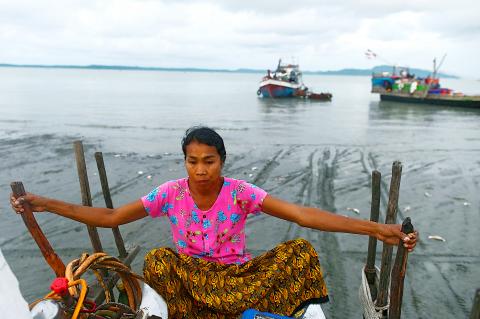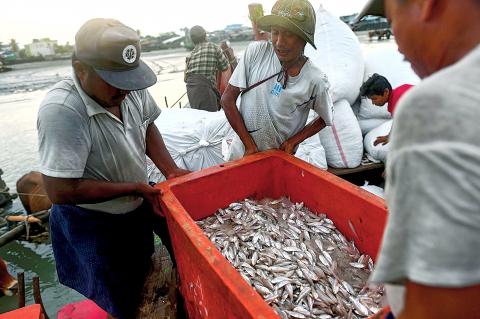Aung Gyi is forced to fish covertly under the shroud of night in western Myanmar waters as China bids to transform the strategically key region into a shipping and industrial hub, squeezing out locals who fear being left behind in the gold rush.
Myanmar has declared Rakhine state, associated by many worldwide with the military’s 2017 bloody crackdown on Rohingya Muslims, open for business but locals fear they are being left out of the gold rush as new rules restrict traditional practises.
Paddies and teak forests will be flattened for a colossal Beijing-backed factory zone and deep-sea port, which will serve as its neighboring giant’s gateway to the Indian Ocean. But the state’s promise for development comes with fishing restrictions — the waterways have been freed up for Chinese ships — a situation that has devastated local lives and livelihoods. “I might be beaten or arrested” if caught fishing illegally, Aung Gyi says as he lays shrimp out to dry by his dilapidated shack in a small fishing hamlet near the town of Kyaukphyu.

Photo: AFP
“But I have no choice. Otherwise, my family would starve,” the 28-year-old adds. Brutal military operations two years ago ravaged the state’s northern fringes and triggered an exodus of hundreds of thousands of Rohingya Muslims, but central Rakhine was left largely unscathed. While many countries and companies remain squeamish about investing in the state, China and other regional giants have no such qualms. Billions of cubic metres of gas and millions of barrels of oil from off-shore rigs are already pumped each year from here across the country to southern China.
Beijing is now poised to cement its grip on the area with the deep-sea port, signed off in November last year, and a colossal Special Economic Zone (SEZ) of garment and food processing factories.
HUMAN RIGHTS ABUSES

Photo: AFP
Further offshore gas development and power stations are already under negotiation with “little if any consideration of the potential cumulative impacts”, says Myanmar Centre for Responsible Business (MCRB) director Vicky Bowman.
Despite Myanmar’s authorities facing allegations of human rights abuses, Singapore, Japan, and Thailand are also competing with China to reap the economic benefits of working with the resource-rich country.
Civilian leader Aung San Suu Kyi said in a recent interview with Japan’s Nikkei that Myanmar welcomes “all friends who are happy to cooperate with us.” But strong local sentiment has stopped projects in the past, such as the Bejing-backed Myitsone dam in northern Kachin state which stalled in the face of country-wide opposition. Today the Kyaukphyu deep-sea port and SEZ are a prize piece in China’s plethora of infrastructure projects spanning the globe under its Belt and Road initiative.
Myanmar last year succeeded in slashing the cost of port from US$7.2 billion to US$1.3 billion, although public details of the framework deal — as with other Chinese-led projects in the country — are scant. China already holds the largest share — around US$4 billion or 40 percent — of Myanmar’s foreign debt.
But economist and government advisor Sean Turnell says fears of the project turning into a debt-trap for Myanmar are no longer valid.
The country would not be “on the hook” if the venture failed, he says — in other words, Myanmar would not take on any outstanding debt.
‘OTHERS PEOPLE’S SLAVES’
Soe Win from the Kyaukphyu SEZ management committee says Myanmar is “definitely” in the stronger negotiating position. “We have control,” he says. He also insists locals will be in line for some of the 400,000 jobs the SEZ will bring to the area — and that they will be given “very good” resettlement deals.
But farmer Saw Maung Nu’s land is among territory earmarked to be swallowed up by the 4,200 acre site and he is scared. “If we’re told to leave, where will we live?” he asks, gesturing from a hilltop to neighboring countryside snapped up by powerful army generals and cronies eager for a windfall of Chinese cash.
The precedent does not bode well.
An onshore gas plant that turned operational in 2013 saw local people turfed from their land.
“They hardly gave us any money at all,” Nu Aye Thar says as she marches along a high-security fence surrounding the gasworks where she used to grow rice and vegetables.
“Without land, we’re simply other people’s slaves,” the 55-year-old adds.
Activist Soe Lwin agrees, saying locals stand to lose out completely from the “uncertain” projects.
“If the money from Rakhine State were actually spent in Rakhine, it would develop overnight.”

Under pressure, President William Lai (賴清德) has enacted his first cabinet reshuffle. Whether it will be enough to staunch the bleeding remains to be seen. Cabinet members in the Executive Yuan almost always end up as sacrificial lambs, especially those appointed early in a president’s term. When presidents are under pressure, the cabinet is reshuffled. This is not unique to any party or president; this is the custom. This is the case in many democracies, especially parliamentary ones. In Taiwan, constitutionally the president presides over the heads of the five branches of government, each of which is confusingly translated as “president”

Sept. 1 to Sept. 7 In 1899, Kozaburo Hirai became the first documented Japanese to wed a Taiwanese under colonial rule. The soldier was partly motivated by the government’s policy of assimilating the Taiwanese population through intermarriage. While his friends and family disapproved and even mocked him, the marriage endured. By 1930, when his story appeared in Tales of Virtuous Deeds in Taiwan, Hirai had settled in his wife’s rural Changhua hometown, farming the land and integrating into local society. Similarly, Aiko Fujii, who married into the prominent Wufeng Lin Family (霧峰林家) in 1927, quickly learned Hoklo (commonly known as Taiwanese) and

The Venice Film Festival kicked off with the world premiere of Paolo Sorrentino’s La Grazia Wednesday night on the Lido. The opening ceremony of the festival also saw Francis Ford Coppola presenting filmmaker Werner Herzog with a lifetime achievement prize. The 82nd edition of the glamorous international film festival is playing host to many Hollywood stars, including George Clooney, Julia Roberts and Dwayne Johnson, and famed auteurs, from Guillermo del Toro to Kathryn Bigelow, who all have films debuting over the next 10 days. The conflict in Gaza has also already been an everpresent topic both outside the festival’s walls, where

The low voter turnout for the referendum on Aug. 23 shows that many Taiwanese are apathetic about nuclear energy, but there are long-term energy stakes involved that the public needs to grasp Taiwan faces an energy trilemma: soaring AI-driven demand, pressure to cut carbon and reliance on fragile fuel imports. But the nuclear referendum on Aug. 23 showed how little this registered with voters, many of whom neither see the long game nor grasp the stakes. Volunteer referendum worker Vivian Chen (陳薇安) put it bluntly: “I’ve seen many people asking what they’re voting for when they arrive to vote. They cast their vote without even doing any research.” Imagine Taiwanese voters invited to a poker table. The bet looked simple — yes or no — yet most never showed. More than two-thirds of those